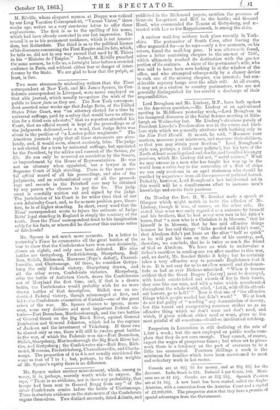Mr. Spence is not much more accurate. In a letter
to yesterday's Times he enumerates n11 the great battles of the war to show that the Confederates have won seven decisively, drawn an eighth, and only once been defeated. His nine battles are Gettysburg, Fredericksburg, Sharpsburg, Bull ltun, Shiloh, Richmond, Manassas (Pope's defeat), Chancel- lorsville, and Chattanooga. Of these, he considers Gettys- burg the only Federal victory, Sharpsburg drawn, and all the other seven, Confederate victories. Sharpsburg, .alias the battle of Antietam Creek, drove the Confederates out of Maryland the first time, and, if that is a drawn battle, the Confederates would probably wish for no more drawn battles of that description. Shiloh was an un- doubted Federal victory, though mismanaged at first, and led t a the Confederate evacuation of Corinth—one of the great crises of the war. Mr. Spence chooses to ignore, more- over, some very decisive and most important Federal vic- tories—Fort Donnelson, Murfreesborough, and the two battles of General Grant on the Big Black River, against General Pemberton and.. General Johnston, which led to the capture of Jackson and the investment of Vicksburg. If these two be classed only as one, there will still be twelve great battles in the war, of which the Federals won six—Fort Donnelson, Shiloh, Sharpsburg, Murfreesborough the Big Black River bat- tles, and Gettysburg; the Confederates six--Bull Run, Rich- mond, Manassas, Fredericksburg, Chancellorsville, and Chatta- nooga. The proportion of 6 to 6 is not usually considered the same as that of 7 to 1 ; but, perhaps, to the false weights of Mr. Spencu's equity there is no difference.






























 Previous page
Previous page